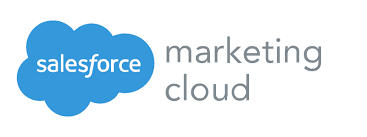MENU
Start
- Best Small Business Loans for 2024
- Businessloans.com Review
- Biz2Credit Review
- SBG Funding Review
- Rapid Finance Review
Our Recommendations
- 26 Great Business Ideas for Entrepreneurs
- Startup Costs: How Much Cash Will You Need?
- How to Get a Bank Loan for Your Small Business
- Articles of Incorporation: What New Business Owners Should Know
- How to Choose the Best Legal Structure for Your Business
Our Guides
- Business Ideas
- Business Plans
- Startup Basics
- Startup Funding
- Franchising
- Success Stories
- Entrepreneurs
Small Business Resources
Grow
- The Best Credit Card Processors of 2024
- Clover Credit Card Processing Review
- Merchant One Review
- Stax Review
Our Recommendations
- How to Conduct a Market Analysis for Your Business
- Local Marketing Strategies for Success
- Tips for Hiring a Marketing Company
- Benefits of CRM Systems
- 10 Employee Recruitment Strategies for Success
Our Guides
- Sales & Marketing
- Finances
- Your Team
- Technology
- Social Media
- Security
Small Business Resources
Lead
- Best Business Phone Systems of 2024
- The Best PEOs of 2024
- RingCentral Review
- Nextiva Review
- Ooma Review
Our Recommendations
- Guide to Developing a Training Program for New Employees
- How Does 401(k) Matching Work for Employers?
- Why You Need to Create a Fantastic Workplace Culture
- 16 Cool Job Perks That Keep Employees Happy
- 7 Project Management Styles
Our Guides
- Leadership
- Women in Business
- Managing
- Strategy
- Personal Growth
Small Business Resources
Find
- Best Accounting Software and Invoice Generators of 2024
- Best Payroll Services for 2024
- Best POS Systems for 2024
- Best CRM Software of 2024
- Best Call Centers and Answering Services for Busineses for 2024
Our Recommendations

Online only. Expires 4/27/2024
Salesforce vs. Zendesk: Which CRM Can Take Your Business Above and Beyond?

Table of Contents
Every business needs to make sales to earn revenue, and customer relationship management (CRM) software makes selling to new and old customers alike much easier. You’ll often hear Salesforce named as the leader in this software-as-a-service (SaaS) field, with Zendesk heralded as a strong competitor. Both platforms rank among our picks for the best CRM software, and their high standings merit an in-depth, side-by-side comparison. With this information, you can determine which solution better fits your business’s needs.
Salesforce vs. Zendesk Compared
Criteria | Salesforce | Zendesk |
|---|---|---|
Prices, plans and free trials | Starts at $25 per user per month; four plans available; 30-day free trial | Starts at $19 per user per month; four plans available; 14-day free trial |
Sales features | Lead, contact, account and opportunity management; mobile app; forecasting and workflow automation | Lead and deal scoring; customizable pipelines; mobile app; sales forecasting |
AI features | Email, calendar and CRM data capture and sync; lead scoring; personalized customer replies and recommendations; custom conversation insights | Available only via Zendesk Suite, not the Zendesk Sell CRM |
Automation tools | Automate email alerts, field updates, workflow tasks and processes | Task automation; power dialing |
Ease of use | Over 4,000 third-party integrations; intuitive online dashboard and mobile app; initial learning curve | Over 1,500 third-party integrations; drag-and-drop widgets and extensively customizable dashboards; “learn more” buttons; minimal learning curve |
Customer service | Videos, community forums, online learning and case submission for all users; 24/7 phone support for extra cost | Online customer support during business hours for all users; 24/7 support with one-hour response time for extra cost |
Who Do We Recommend Salesforce For?
We recommend Salesforce Sales Cloud for small businesses in need of a feature-rich CRM that excels at contact management and data tracking in particular. We especially like the Sales Cloud Starter CRM package for small businesses since it includes only the tools you’ll first need when starting with a CRM. As your business’s sales operations expand, you can upgrade to higher-priced tiers to obtain more features. Transitioning among packages is typically a seamless process unlikely to interrupt your business operations.
We also recommend Salesforce if your sales team is looking to seize exactly the right moment to make a sale. That’s because we found Salesforce’s AI suite, which identifies these prime moments to take action, exceptionally impressive. You can see AI-generated, personalized sales insights right from your Sales Cloud dashboard, which is well organized and user-friendly. In our many years of testing the Salesforce CRM, we’ve found that the platform deserves its field-leading reputation. Learn more in our comprehensive Salesforce review.
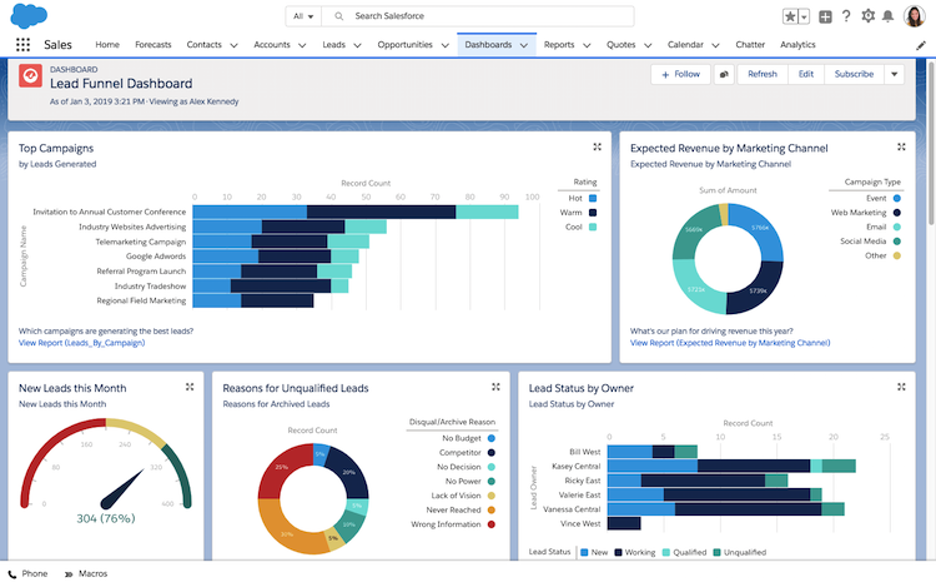
The clearly laid-out, deftly navigable Salesforce dashboard displays your key sales data in a neat, unimposing manner. Source: Salesforce
We rank Salesforce among the best CRM solutions because:
- Its depth and breadth of features are uncommon among CRM providers.
- Its dashboard is easy to make sense of, and the data it includes is highly actionable.
- Its AI tools for identifying sales opportunities and keeping up on your data are best in class.
Who Do We Recommend Zendesk For?
We recommend Zendesk Sell for customer service teams that need to manage every part of the customer lifecycle. That’s because the Zendesk Sell CRM, when combined with the Zendesk Suite ticketing and customer service platform, powers every part of your sales pipeline. That’s by design – Zendesk added CRM software to its technology stack well after it built a strong reputation for its ticketing and customer service solution. We found Sell and Suite easy and effective to use in conjunction for generating, qualifying and reviving leads.
Even if you have no need for a ticketing or customer service solution, we still recommend Zendesk Sell for a robust, user-friendly, lead-oriented CRM. Your team gets extensively customizable sales pipelines and CRM dashboards with all Sell plans so you can orient the platform to your standard sales process. Plus, with over 1,500 integrations, you can connect Zendesk with your other business tools to create an all-encompassing solution for your sales needs. Get more details in our full Zendesk review.
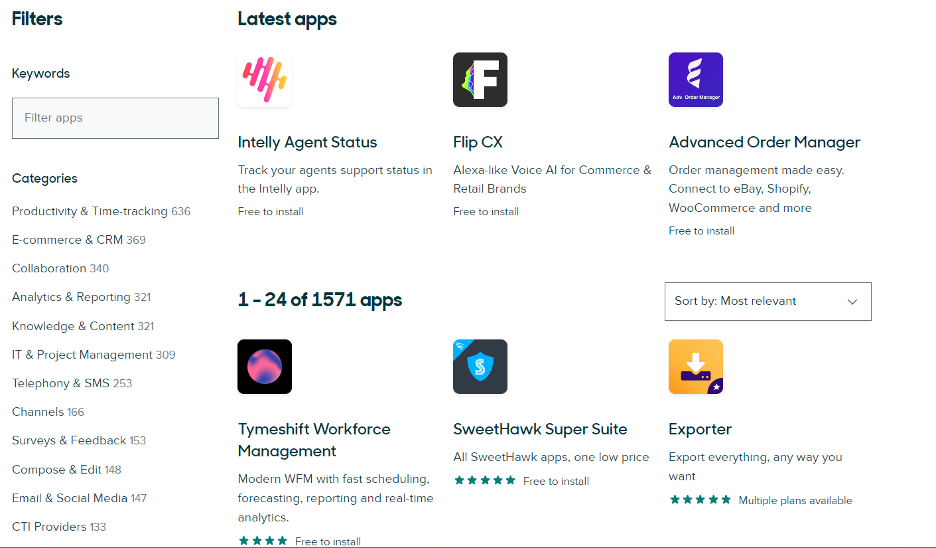
In the Zendesk app marketplace, the vendor always lists the newest options first so you can see the latest integrations available to your team. Source: Zendesk
Zendesk Sell is a high-quality CRM because:
- It combines with Zendesk Suite to support every stage of the customer lifecycle.
- Its sales pipelines and dashboards are extensively customizable, making for a highly user-friendly CRM experience.
- You can access over 1,500 integrations, further driving the platform’s usability.
Salesforce vs. Zendesk Comparison
Prices, plans and free trials
Salesforce
Sales Cloud, the Salesforce CRM suite, is available in four pricing packages:
- Starter: This plan costs $25 per user per month and includes basic account, lead, opportunity and contact management features. It also includes Salesforce’s Gmail and Outlook integrations.
- Professional: This package, which costs $80 per user per month, adds forecast management features to everything in the Starter plan.
- Enterprise: For $165 per user per month, you get advanced pipeline tracking and management alongside workflow and process automation. These features are in addition to everything from the Professional tier.
- Unlimited: As its name suggests, this level, which costs $330 per user per month, gives your business access to all Salesforce tools, including built-in AI.
All Salesforce plans include the company’s Standard Success customer service package. If you want more premium support, you must pay 30 percent of your net license fees to add Premier Success, while Salesforce provides customized quotes for its Signature Success customer service package. We found it frustrating that only these two add-on customer service packages include phone support. Many rival CRM vendors offer phone support without requiring extra fees.
Beyond customer service, Salesforce offers these Sales Cloud add-ons:
- CPQ & Billing: For $75 per user per month, you get features for more easily creating, pricing and quoting your customers on complex, customized solutions.
- Sales Cloud Einstein: This is the Sales Cloud AI. It costs $50 per user per month to add to your Sales Cloud package, though Sales Cloud Unlimited includes it without any extra payments.
- Marketing Cloud Account Engagement: An extremely expensive add-on at $1,250 per user per month, Marketing Cloud Account Engagement is designed for executing B2B marketing from within your Salesforce CRM. You can use this add-on to interact directly with your customers, build more pipeline and land more deals.
When you sign up for Sales Cloud, you’ll likely be locked into a yearlong contract. We generally dislike it when business technology vendors require contracts, and we feel especially strongly that Salesforce’s contracts are too restrictive. That said, we also found that Salesforce’s 30-day free trial was long enough that we weren’t rushed in deciding whether the platform met our needs.
We still believe Salesforce’s pricing is troubling, though. That’s because, for a sales team looking to maximize its performance across the sales pipeline, you need to purchase the Sales Cloud Enterprise package for all the necessary sales tools. Sure, we were impressed with how many features Sales Cloud Starter includes, given its price, but this still wasn’t enough for full pipeline management. A yearlong Enterprise contract at $165 per user per month, with additional phone support fees, makes Salesforce a frustratingly expensive, though incomparably powerful, proposition.
Zendesk
Zendesk Sell’s four pricing packages break down as follows:
- Sell Team: The introductory Zendesk Sell plan costs $19 per user per month. It includes calendar and email integrations, sales dashboards ready to go out of the box, and tools for setting appointments and tasks. You can also use Sell Team to send texts and track and record calls. The plan comes with the Zendesk Core API as well as two customizable sales pipelines.
- Sell Growth: For $55 per user per month, you get everything in Sell Team, plus 10 total customizable pipelines and access to the Zendesk Premium API. Additional features include a product and price book, customizable advanced sales reports, enrichment and prospecting credits, goal tracking, and sales forecasting.
- Sell Professional: You’ll pay $115 per user per month for Sell Professional, which brings your total number of customizable pipelines to 20. Alongside everything in Sell Growth, you get task automation, lead and deal scoring, and a company hierarchy with advanced roles and permissions.
- Sell Enterprise: This plan starts at $169 per user per month and enables you to extensively customize Zendesk Sell. It introduces features such as unlimited sequences and pipelines, a direct-dial phone number, and a business tech stack.
All Zendesk packages include online customer support during your company’s operating hours. You’ll need to sign up for the Premier add-on to get 24/7 support with proactive monitoring and a guaranteed one-hour response time. Additional add-on options include technical account management and professional services, which include CRM configuration by Zendesk and custom app development. Across our years of testing Zendesk, we have never been able to obtain upfront pricing for these add-ons.
Nevertheless, we like Zendesk’s base pricing overall. Its relatively modest $115-per-user-per-month cost for the automation and lead scoring tools in Sell Professional offset the vendor’s somewhat short 14-day free trial. We do, though, remain frustrated that it costs extra to get 24/7 support from Zendesk. Many competitors offer this as part and parcel of their pricing (though not Salesforce).
Winner: Zendesk
With Zendesk, you get lead scoring – a key CRM feature – at lower prices than with Salesforce. However, both platforms require additional payments for 24/7 customer support and relegate key sales features to higher packaging platforms. While we dislike both vendors’ all-in pricing, Zendesk at least offers a better deal than Salesforce.
If budget is a concern, you may want to consider a lower-cost competitor, such as Zoho CRM, for access to key tools at much more affordable prices. Read our Zoho CRM review to learn more.
Sales features
Salesforce
All Salesforce plans give you robust tools for managing your leads, customers, opportunities and client accounts. Name a CRM feature you find important, and chances are it’s available through Salesforce – even the Sales Cloud Starter package includes a sales app builder. Additionally, you can use the Salesforce iOS and Android mobile app no matter your Sales Cloud plan.
However, Sales Cloud Starter, the lowest-priced Salesforce plan, doesn’t include forecast management tools. We find the $80 per user per month you’ll pay for the Professional tier reasonable for how much this tool will benefit your sales prospects. The $165 per user per month you pay for foundational automation and advanced pipeline features via Enterprise is steep, but we like the tools themselves. They’re easy to use, and they’re quite powerful too, reminding us why Salesforce has earned its reputation as a leading CRM platform.
Zendesk
All Zendesk Sell plans include customizable pipelines, though the quantity varies. We like how easy Zendesk makes it to conform the pipelines to your company’s usual sales process. No two businesses move prospects through their sales funnels in quite the same way, and with Zendesk, you can do things your own way.
We also appreciate Zendesk’s tools for scoring leads and forecasting sales. You get scoring tools with Sell Professional and forecasting with Sell Growth, making these CRM functions relatively accessible with Zendesk. There’s also a Zendesk iOS and Android mobile app so you can power your sales efforts on the go.
Winner: Salesforce
Admittedly, we found it disappointing that accessing lead scoring tools is so much more expensive with Salesforce than with Zendesk. Other than that, though, at every comparable pricing point, Salesforce simply offers more sales features than Zendesk.
AI features
Salesforce
All Salesforce CRM plans – even Sales Cloud Starter – include the brand’s Einstein AI to automatically log activity. The information Einstein AI logs includes CRM, calendar and email data. Additionally, with Sales Cloud Unlimited, you can use the full Salesforce AI suite. This set of tools streamlines lead scoring and gleans one-of-a-kind actionable insights from deals, calls and interactions.
We like that with Salesforce, you can truly harness cutting-edge technology to power your sales strategies. Whether used for basics such as activity logging or more in-depth lead scoring needs, Salesforce’s AI adds extra power to your efforts.
Zendesk
There are no AI tools available with Zendesk Sell. You must instead purchase Zendesk Suite, the vendor’s solution for full-on customer service teams, to access AI features.
We dislike that for small businesses that need only a CRM via Zendesk, AI functionality is unavailable. Sure, your business can operate just fine without AI – chances are you’ve done so for years. But for Zendesk not even to allow access to this increasingly prominent technology for its CRM users is a significant drawback.
Winner: Salesforce
The winner in this category is clear because only Salesforce CRM users get AI tools. Unless you’re planning to implement Zendesk Suite, not just the Zendesk Sell CRM, you’re out of luck when it comes to AI features if you go with Zendesk for your CRM software.
Automation tools
Salesforce
You can use Salesforce Sales Cloud to automatically send email alerts and update customer data fields. There are extensive workflow and process automation tools available within the CRM as well, especially when it comes to approvals. We like how easy Salesforce makes it to lay out, implement and automate even the most sophisticated approval workflows.
When learning about CRM platforms, you may encounter the term “sales force automation.” This term is different from automating tasks within Salesforce, but the latter can power the former.
Zendesk
All Zendesk plans include sales triggers alongside task- and appointment-setting tools. Sell Growth and all plans above it also come with automated distribution and email targeting. With Sell Professional and Enterprise, you can create automations where one action triggers immediate task assignment and creation. There are also tools for customizing your notifications within both of these Zendesk packages.
We like Zendesk’s automation tools based on our experimentation. They covered nearly all our needs when it comes to replacing manual tasks with automatic, computer-handled actions. Zendesk’s automation suite is also intuitive to navigate and use.
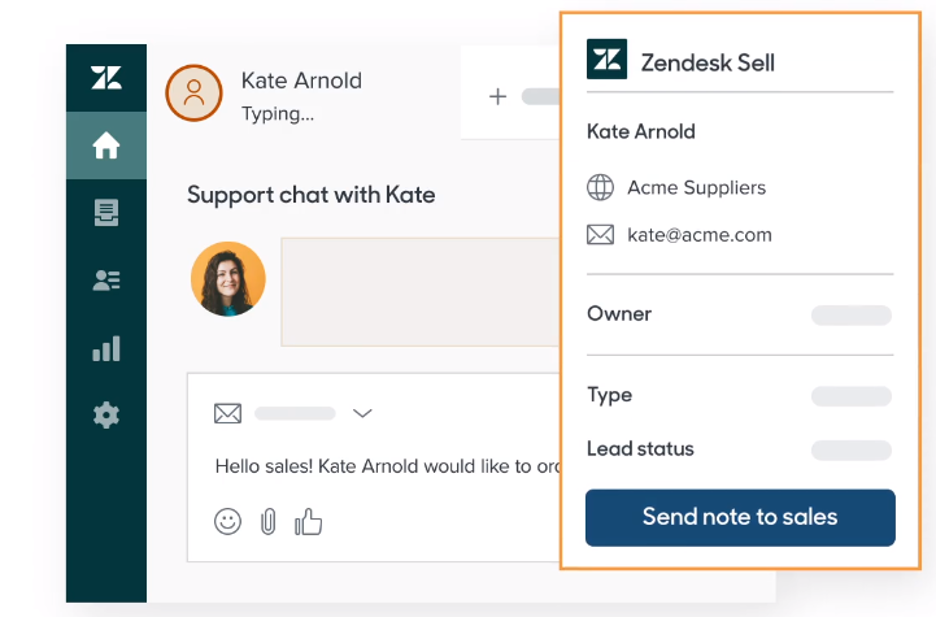
Zendesk’s tools for creating sales team tasks based on customer needs are intuitive and largely automated. Source: Zendesk
Winner: Salesforce
Both Zendesk and Salesforce excel at CRM automation, but the latter platform wins by just a bit. We found it ever so slightly easier to use Salesforce’s automation tools, plus its features are somewhat more in-depth.
Ease of use
Salesforce
Although there’s certainly a learning curve when you first start using the Salesforce CRM, that’s really the only usability challenge with this platform. Over our years of testing this vendor’s technology, we’ve found its online dashboard and mobile app increasingly intuitive.
We also like how much added usability we got when we connected the thousands of integrations available via Salesforce’s AppExchange marketplace. The software connections we built through these integrations made Salesforce a remarkably high-powered, high-performing CRM that felt unimposing to use.
Zendesk
All Zendesk widgets are drag-and-drop, so you can reorder your dashboard to fit exactly how you’d like to navigate and use the platform. This customizability greatly impressed us – we had fun toying with layouts and deciding which one worked best for us.
Another major point for Zendesk as usability goes: “Learn more” buttons abound, through which you can fully understand how the tools on your screen work. These buttons saved us lots of time we might have spent looking through online learning resources or attempting to contact Zendesk’s customer support team. Thanks to the time your team gets back with this CRM’s straightforward functionality, your business can expand its capacity to directly serve its customers.
Winner: Zendesk
Salesforce is no slouch when it comes to ease of use (minus the initial learning curve), but Zendesk goes above and beyond on this front. From its extensively customizable dashboard layouts to the incredibly helpful “learn more” buttons, Zendesk gives you everything you need for an enjoyable user experience.
Customer service
Salesforce
All Sales Cloud customers can use Salesforce’s self-guided online resources, such as articles, webinars and community forums. You can also submit support cases online to get help from the Salesforce team via asynchronous messaging.
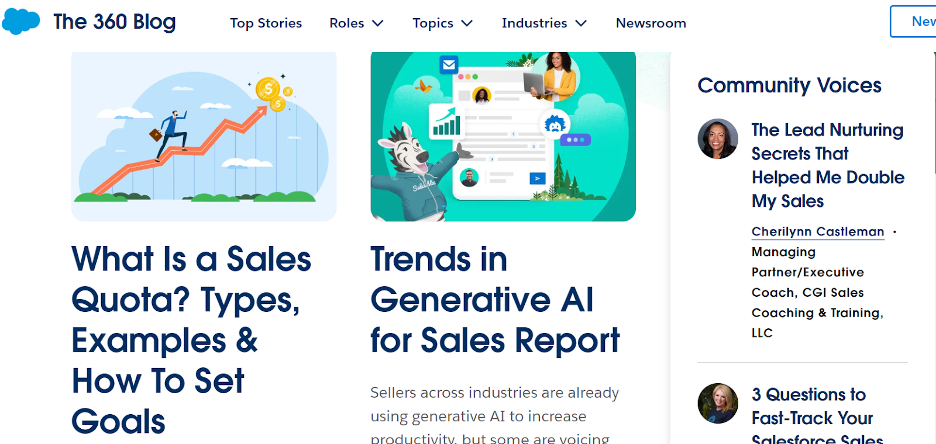
The online resources available through Salesforce include community-generated content from fellow Sales Cloud users. Source: Salesforce
However, the 24/7 phone support that so many other CRM vendors offer is an add-on, not an automatic inclusion, with Sales Cloud. We were frustrated that this standard assistance is a pricey extra with Salesforce. The hefty price tag, though, does come with other great customer support services, such as expert coaching. Nevertheless, we strongly believe that phone support, even if not 24/7, should never cost extra when purchasing business software.
Zendesk
You can get online customer support during your operating hours with Zendesk Sell. We like that this option exists, but we dislike that 24/7 support is available only via the Premier add-on. You at least get a guaranteed one-hour response time, as well as proactive monitoring, with this add-on, which is nice. We still feel, though, that these extras don’t make up for the inherent lack of phone support or 24/7 customer service access in Zendesk’s core plans.
Winner: Zendesk
As with pricing, we don’t quite like either Salesforce or Zendesk’s base options for customer service, but if we had to choose one, we’d go with Zendesk. Over the many years we’ve tested both platforms, we’ve found it easier to get assistance via Zendesk’s included online support suite. As you make a buying decision, however, keep in mind that many other CRM platforms have 24/7 live chat support or business-hours phone support at no extra cost.
Keap is a high-quality CRM that offers phone support during business hours for all users. Learn more via our Keap review.
Salesforce vs. Zendesk Recap
Choose Salesforce if:
- You want the highest-quality, most in-depth AI tools in the CRM space.
- You need a feature-rich CRM from a leading name in the industry.
- You’re looking for an expansive yet simple CRM automation suite.
Choose Zendesk if:
- You want lead scoring tools at a modest price point.
- You need thoroughly customizable sales pipelines and dashboards.
- You’re looking for a CRM platform to supplement your customer service and ticketing suite.
FAQ
Zendesk is highly secure. All incoming and outgoing Zendesk communications are encrypted with HTTPS/TLS 1.2 or higher, the industry standard.
Approximately 2,500 large companies use Zendesk, including Shopify, Stripe and Uber. These businesses are likely using Zendesk Suite for full customer service and ticketing. Zendesk Sell, the vendor’s CRM that’s separate from Zendesk Suite, is effective for all businesses regardless of size.
No, you do not need to know how to code to use Salesforce. You can use the CRM without any coding knowledge whatsoever.
Yes, you can learn Salesforce without any expert assistance. The vendor provides a wealth of self-guided online resources, though there may be a learning curve for first-time users or those new to CRM platforms. Nevertheless, with patience, mastering Salesforce all by yourself is entirely possible.




